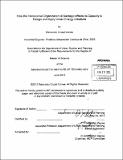| dc.contributor.advisor | P. Christopher Zegras. | en_US |
| dc.contributor.author | Cruzat Correa, Raimundo | en_US |
| dc.contributor.other | Massachusetts Institute of Technology. Department of Urban Studies and Planning. | en_US |
| dc.coverage.spatial | s-cl--- | en_US |
| dc.date.accessioned | 2013-10-24T17:37:27Z | |
| dc.date.available | 2013-10-24T17:37:27Z | |
| dc.date.copyright | 2013 | en_US |
| dc.date.issued | 2013 | en_US |
| dc.identifier.uri | http://hdl.handle.net/1721.1/81634 | |
| dc.description | Thesis (S.M.)--Massachusetts Institute of Technology, Dept. of Urban Studies and Planning, 2013. | en_US |
| dc.description | Cataloged from PDF version of thesis. | en_US |
| dc.description | Includes bibliographical references (p. 96-98). | en_US |
| dc.description.abstract | The need for greater levels of energy efficiency has never been as clear as it is now. In the case of Chile, factors such as high energy consumption, high energy prices and growing concern for the environment and energy security have contributed to a growing awareness of the need for further developing energy efficiency. However, this awareness has mainly stayed at a strategic level and has not translated into concrete actions at the urban level, and energy efficiency is not a normal habit for all public and private stakeholders. Chilean cities, and particularly Santiago, given its huge impact in the country's energy consumption, should have an important role to play. Nevertheless, few efforts had been made at the city level. This thesis examines why this is the case, using a mix of methods: case study analysis of New York City (USA) and London (UK) and interviews and a follow-up survey with relevant actors from the Chilean energy and political sectors. Based on this analysis, this thesis concludes that the lack of organizations and institutions covering Santiago as a single urban unit is affecting its capacity to develop and implement energy efficiency initiatives and policies. The thesis concludes with a preliminary institutional proposal through which energy efficiency could be addressed in a coordinated way in Santiago. | en_US |
| dc.description.statementofresponsibility | by Raimundo Cruzat Correa. | en_US |
| dc.format.extent | 106 p. | en_US |
| dc.language.iso | eng | en_US |
| dc.publisher | Massachusetts Institute of Technology | en_US |
| dc.rights | M.I.T. theses are protected by
copyright. They may be viewed from this source for any purpose, but
reproduction or distribution in any format is prohibited without written
permission. See provided URL for inquiries about permission. | en_US |
| dc.rights.uri | http://dspace.mit.edu/handle/1721.1/7582 | en_US |
| dc.subject | Urban Studies and Planning. | en_US |
| dc.title | How the institutional organization of Santiago affects its capacity to design and apply urban energy initiatives | en_US |
| dc.type | Thesis | en_US |
| dc.description.degree | S.M. | en_US |
| dc.contributor.department | Massachusetts Institute of Technology. Department of Urban Studies and Planning | |
| dc.identifier.oclc | 859403308 | en_US |
